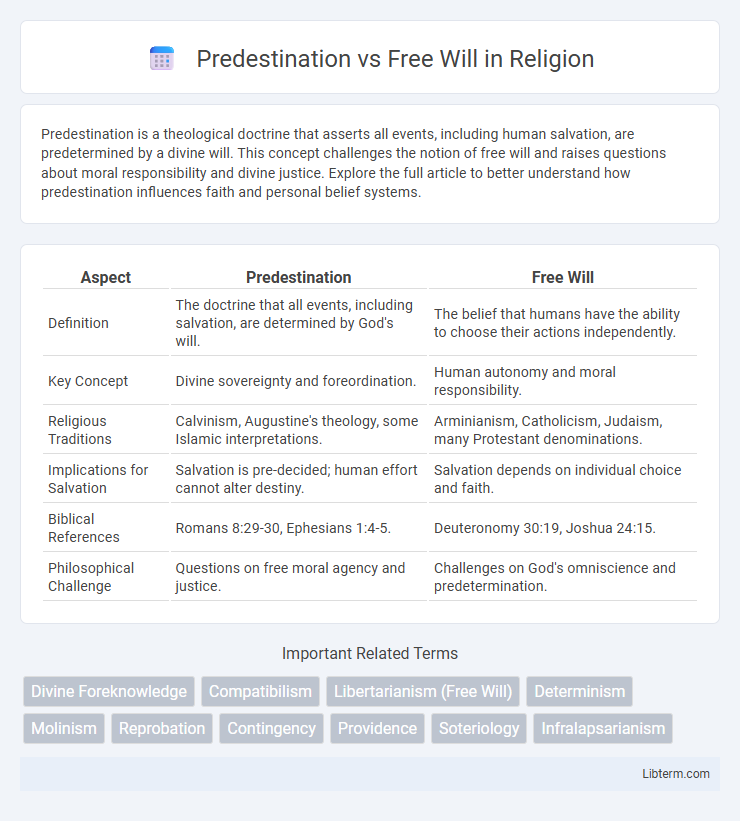Predestination is a theological doctrine that asserts all events, including human salvation, are predetermined by a divine will. This concept challenges the notion of free will and raises questions about moral responsibility and divine justice. Explore the full article to better understand how predestination influences faith and personal belief systems.
Table of Comparison
| Aspect | Predestination | Free Will |
|---|---|---|
| Definition | The doctrine that all events, including salvation, are determined by God's will. | The belief that humans have the ability to choose their actions independently. |
| Key Concept | Divine sovereignty and foreordination. | Human autonomy and moral responsibility. |
| Religious Traditions | Calvinism, Augustine's theology, some Islamic interpretations. | Arminianism, Catholicism, Judaism, many Protestant denominations. |
| Implications for Salvation | Salvation is pre-decided; human effort cannot alter destiny. | Salvation depends on individual choice and faith. |
| Biblical References | Romans 8:29-30, Ephesians 1:4-5. | Deuteronomy 30:19, Joshua 24:15. |
| Philosophical Challenge | Questions on free moral agency and justice. | Challenges on God's omniscience and predetermination. |
Introduction to Predestination and Free Will
Predestination is the theological doctrine asserting that all events, including human actions and salvation, are eternally decreed by a divine power, often linked to doctrines in Calvinism and Augustine's teachings. Free will, conversely, emphasizes human autonomy in making choices independent of predetermined destiny, central to Arminianism and many philosophical traditions. The debate highlights tensions between divine omniscience and moral responsibility, influencing ethical theories and religious practices.
Historical Perspectives on Predestination
Historical perspectives on predestination span from Augustine's doctrine asserting divine foreknowledge and grace as determining salvation to Calvin's reformation teachings emphasizing irresistible grace and unconditional election. Early Christian theologians debated the balance between God's sovereignty and human responsibility, influencing various Christian denominations' views on salvation. The ongoing discourse reflects enduring tensions in reconciling divine omniscience with moral human freedom.
Philosophical Foundations of Free Will
Philosophical foundations of free will emphasize agent causation and the capacity for individuals to make autonomous choices independent of deterministic forces. Key concepts include libertarianism, which argues that free will cannot coexist with determinism, and compatibilism, which reconciles free will with causal determinism by redefining freedom as acting according to one's desires without external constraints. Foundational philosophers such as Immanuel Kant and William James have contributed significantly to debates surrounding moral responsibility, autonomy, and the nature of human agency within the free will framework.
Religious Interpretations Across Cultures
Predestination and free will are central themes in religious interpretations worldwide, shaping believers' understanding of human fate and divine authority. In Christianity, especially within Calvinism, predestination emphasizes God's sovereign choice in salvation, contrasting with Catholic and Arminian views that highlight human free will in accepting grace. Islamic theology balances divine decree (Qadar) with human responsibility, while Hinduism integrates karma and dharma, reflecting a complex interplay between destiny and autonomous action in spiritual progress.
Major Arguments Supporting Predestination
Predestination asserts that all events, including human actions, are determined by divine will, emphasizing the sovereignty of God in controlling destiny. Major arguments supporting predestination include scriptural references such as Romans 8:29-30 and Ephesians 1:4-5, which highlight God's foreknowledge and eternal election of believers. The philosophical stance argues that predestination ensures divine justice and omniscience, making human free will secondary to God's predetermined plan.
Key Defenses of Free Will
Key defenses of free will emphasize human moral responsibility and the experience of personal agency, arguing that individuals possess the capacity to make genuine choices independent of deterministic forces. Philosophers like libertarians assert that free will is incompatible with strict predestination, highlighting the necessity of autonomous decision-making for ethical accountability. Empirical studies in psychology and neuroscience also support the notion of free will by demonstrating variability in human behavior influenced by conscious deliberation rather than predetermined causality.
Scientific Views on Human Choice
Scientific views on human choice often explore the interplay between predestination and free will through neuroscience and psychology, revealing that brain activity related to decision-making can precede conscious awareness, suggesting deterministic processes. Research in neurobiology highlights the role of genetic and environmental factors influencing behavior, challenging the notion of absolute free will. However, cognitive studies emphasize the complexity of human consciousness and the capacity for self-reflection, which supports the experience of agency despite underlying biological constraints.
Predestination vs Free Will in Literature and Art
Predestination versus free will in literature and art explores the tension between fate and individual choice, often depicting characters struggling against or embracing predetermined destinies. Classic works like Milton's *Paradise Lost* and Dostoevsky's *Crime and Punishment* examine moral responsibility within cosmic or divine frameworks, while modern art frequently visualizes this conflict through symbolic imagery and existential themes. This thematic dichotomy drives narratives and artistic expressions, challenging audiences to consider the balance between destiny and autonomy.
Modern Debates and Ethical Implications
Modern debates on predestination versus free will center on reconciling determinism with moral responsibility, with neuroscientific findings challenging traditional views of autonomous choice. Ethical implications arise in legal systems where accountability depends on whether actions are seen as freely chosen or predetermined, impacting concepts of justice and punishment. Philosophers and ethicists examine how belief in predestination might influence behaviors, particularly regarding motivation, moral accountability, and societal norms.
Conclusion: Finding Balance Between Fate and Choice
The debate between predestination and free will emphasizes finding a balance where fate sets certain boundaries while personal choice shapes individual outcomes. Recognizing predetermined elements allows for understanding external influences, yet exercising free will empowers responsible decision-making and moral growth. This balance fosters a nuanced perspective that respects both cosmic design and human agency in shaping life's path.
Predestination Infographic

 libterm.com
libterm.com